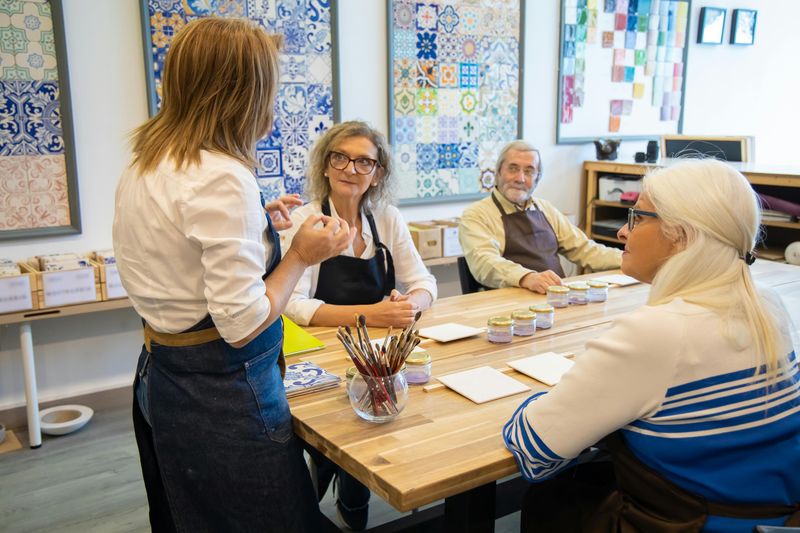Finding joy after 40 doesn’t always require big life changes. Sometimes the smallest habits create the biggest shifts in happiness. As we navigate midlife, these tiny tweaks can transform our daily experience from ordinary to extraordinary. Here are twelve simple practices that science shows can significantly boost happiness during this rich and complex life stage.
1. Prioritize Quality Sleep
Sleep becomes your secret weapon for happiness after 40. Your body’s changing sleep needs require more attention now than in your younger years.
Creating a bedtime ritual signals your brain it’s time to wind down. Try keeping electronics out of the bedroom, maintaining a consistent sleep schedule, and making your bedroom a true sanctuary with comfortable bedding and soothing colors.
Even small improvements in sleep quality can dramatically affect your mood, energy levels, and ability to handle stress the next day. When you wake refreshed, life’s challenges seem more manageable and opportunities more exciting.
2. Move Your Body Daily
Gentle movement works wonders for your mood after 40. Your body craves activity, even when motivation feels elusive.
Walking around the block, stretching while watching TV, or dancing in your kitchen to favorite songs counts. The key isn’t intensity but consistency – finding movement that brings joy rather than feeling like punishment.
Regular movement releases endorphins that naturally elevate mood while keeping joints flexible and muscles strong. Many midlifers report that their daily walk or yoga practice becomes less about physical benefits and more about the mental clarity and emotional balance they experience afterward.
3. Cultivate Daily Gratitude
Gratitude transforms ordinary moments into extraordinary treasures. Taking just minutes each day to notice what’s going right creates a powerful shift in perspective.
A simple notebook by your bed or a gratitude app on your phone makes this practice easy. Jot down three specific things you appreciated today – the perfect cup of coffee, a colleague’s kind word, or the way sunlight filtered through leaves on your drive home.
Brain research shows that consistent gratitude practice actually rewires neural pathways over time. After a few weeks, you’ll find yourself automatically noticing positive aspects of your day that previously went unappreciated.
4. Strengthen Meaningful Friendships
Friendship becomes more precious with age. Quality connections matter more than your social media follower count or holiday card list.
Reaching out to one friend weekly for coffee or a phone call creates more happiness than scrolling through hundreds of online updates. Friendships after 40 tend to be more authentic as we’ve learned who truly nourishes our spirits.
Research consistently shows that strong social connections predict happiness better than income, physical health or other factors. These relationships provide both celebration partners during good times and essential support systems when life throws inevitable curveballs.
5. Embrace Lifelong Learning
Learning something new lights up your brain with excitement. After 40, pursuing interests purely for joy rather than career advancement creates a special kind of happiness.
Take that pottery class you’ve always been curious about. Download a language app and learn ten minutes daily. Join a book club that stretches your reading preferences. Your mature brain forms new neural connections with each new skill.
Learning at this life stage often feels more relaxed without the pressure of grades or professional requirements. Many midlifers discover hidden talents or passions they never knew existed simply by giving themselves permission to become beginners again.
6. Connect With Nature Daily
Nature offers medicine for modern life stresses. Even brief outdoor time reduces cortisol levels and improves mood regardless of weather conditions.
Morning coffee on your porch listening to birds, lunch break walks through a nearby park, or weekend gardening all count. Notice how your shoulders relax and breathing deepens when surrounded by trees, water, or open sky.
Research shows that time outdoors improves creativity, reduces rumination, and provides perspective on problems that seem overwhelming indoors. Many people find that regular nature connection helps them feel part of something larger than themselves – a powerful antidote to midlife questions about purpose and meaning.
7. Simplify Your Surroundings
Clutter creates hidden stress that affects mood. Many discover that after 40, owning less actually feels like gaining more – more space, time, and mental clarity.
Start small with one drawer or closet rather than overwhelming yourself. Ask a simple question about each item: “Does this add value to my current life?” Many find joy in passing belongings to others who need them more.
Physical decluttering often leads to mental decluttering too. People report better sleep, reduced anxiety, and more creativity in spaces that contain only what they truly use and love. Simplicity creates room for what matters most at this stage of life.
8. Filter Your Information Diet
What enters your mind shapes your reality. After 40, being selective about media consumption becomes essential for mental wellbeing.
Consider a news curfew – no headlines before breakfast or after dinner. Replace one hour of social media scrolling with reading something that inspires you. Unfollow accounts that leave you feeling inadequate or anxious.
Many find that limiting negative inputs dramatically improves their outlook within days. This doesn’t mean avoiding reality, but rather choosing information sources thoughtfully and timing consumption strategically. Your attention is precious – invest it in content that enriches rather than depletes your emotional reserves.
9. Find Joy Through Giving
Helping others creates a happiness boost that money can’t buy. After 40, many discover that contribution becomes increasingly meaningful as a source of purpose and connection.
Small acts matter – driving an elderly neighbor to appointments, mentoring someone starting in your field, or volunteering monthly at a cause you care about. The key is finding ways to give that energize rather than drain you.
Research shows that regular acts of kindness activate pleasure centers in the brain similar to those triggered by receiving rewards. Many midlifers report that their giving activities provide perspective on personal problems while creating community connections that enrich life immeasurably.
10. Practice Present-Moment Awareness
Mindfulness transforms ordinary moments into opportunities for joy. After decades of rushing through life, learning to fully inhabit the present moment feels revolutionary.
Start with five minutes daily of simply noticing your breath or the sensations in your body without judgment. Gradually extend this awareness into everyday activities – really tasting your food, feeling water on your skin while showering, or listening completely when someone speaks.
Regular mindfulness practice has been shown to reduce anxiety about the future and regrets about the past – both common midlife concerns. Many practitioners report that simple moments like watching a sunset or sipping tea become unexpectedly profound when experienced with full attention.
11. Acknowledge Your Small Victories
Celebrating tiny wins creates momentum for happiness. After 40, learning to be your own cheerleader becomes especially valuable.
Keep a “done list” instead of just a to-do list. Note when you made a healthy food choice, handled a difficult conversation well, or simply got through a challenging day. These acknowledgments build self-trust and confidence.
Many find that pausing to celebrate small accomplishments actually increases motivation and resilience. This practice counteracts the tendency to focus only on what’s left undone or what didn’t go perfectly. Your brain responds to these micro-celebrations by releasing dopamine, making it easier to tackle the next challenge.
12. Prioritize Preventive Health Checks
Taking charge of your health creates peace of mind. After 40, regular screenings move from optional to essential for both physical wellbeing and emotional security.
Schedule annual physicals, dental cleanings, eye exams and recommended screenings based on your age and risk factors. Many find that tracking these appointments in a dedicated health calendar reduces worry about missing something important.
Beyond the obvious physical benefits, staying proactive about health screenings reduces anxiety about the unknown. Knowledge is power, and many report that regular check-ups actually increase their sense of control and confidence about aging. When health concerns are addressed early, you have more energy to focus on enjoying life.












